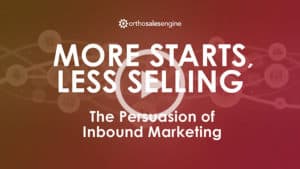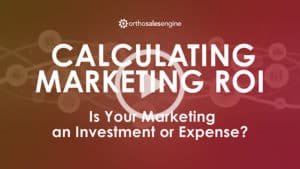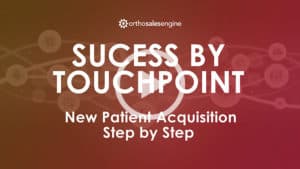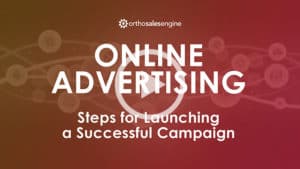This one mistake could be costing you thousands, even tens of thousands of dollars a year if you're making it.
So my question to you is when you get a lead through an ad, a billboard Google, whatever, where does that lead go?
▪ Some of you don't know the answer to that question. You've already paid money to get the lead.
So where does the lead go? Is it just an email to the front desk?
Is it going to a spreadsheet? Are you writing it down on paper or is it going into A CRM?
▪ ▪ ▪ ▪ ▪ ▪ ▪ ▪ So what is a CRM customer relations management system?
So what is that? That's a place for your lead to go.
It's a piece of software that, that contact information is going to go.
It's much like your patient management system, but this is before they become a patient, they're going to this piece of software, you're gonna find out where they are, you're gonna be able to write notes, you're gonna be able to track their conversations and see what's happening with that lead.
Your CRM is a place for all the people who have not come into the office yet who have not booked an appointment yet.
Having a CRM is critical to the success of your digital marketing campaign.
▪ ▪ ▪ ▪ ▪ ▪ ▪ Ok.
A lot of you are probably getting leads to the email at the front desk.
You give them a call, you email them, try to book the appointment.
But what happens when they say no, then what happens to the lead if it's not in a CRM?
How do you follow up with it again?
What if the person who originally made that phone call left the office or is sick?
And another staff member needs to follow up with, with them that day?
Do they have notes in the system of what happened?
▪ Do they know what they should be following up with them on? Do they know what the obstacle was?
Did they just leave a voicemail or did they connect with the person?
You need to know all this information so that you could follow up with them effectively and efficiently?
What if you're actually just putting it on a piece of paper?
You're just writing down the list of these people on the paper? What happens to that paper?
It probably just gets tossed into the garbage or it's filed away and no one ever uses it again.
The next best thing of course is just a spreadsheet Excel, Google spreadsheets, blah, blah, blah.
▪ You get it, it gets filled into a spreadsheet. You follow them, you leave a little note.
What's the problem with that? Well, it's really hard to find the person for one.
How do you do extra notes? You really should be segmenting them.
We'll talk about that a little later and then really when nothing really happens, the lead just sits there, there's no action that's happening when they sit there in a spreadsheet.
And how do you follow up with them later?
How do you get the task or that notice that you need to follow up with them?
The CRM allows you to do all of these things.
▪ ▪ ▪ ▪ ▪ ▪ ▪ So the next reason you need a CRM is lead nurturing.
So lead nurturing is that communication that happens after that touch point that they maybe saw the ad or they went to your event, they saw you in the billboard, you've gotten their contact information, it's now in your ecosystem.
What are you doing then? Let's just take a Facebook ad.
For instance, they signed up, it was an ad for $500 off Invisalign. They filled in the lead ad.
It went into your CRM and then they automatically got a text. Thank you for your interest.
▪ You can schedule an appointment right now by clicking here. They got an email with some similar information.
I'll make sure to expect us. We'll be calling you very soon. Thank you.
And in between that, maybe they get another little email.
Hey, this is what it's like to come to our office. Here's a great video showing you a walkthrough.
It's unlimited, what you can do with these lead nurturing campaigns.
The point is your brand, your office is communicating with this lead who has never physically met you yet and warming them up.
They're, they're creating, you're creating a relationship with that person before they ever talk to a human in your office.
And why do you want to do that?
Because the warmer they are, the more they've been nurtured, the more you've become the resource, the expert, the person they trust and the easier it will be to convert that person who's never heard of you before into a start, who's now on contract with you.
▪ ▪ ▪ ▪ ▪ ▪ ▪ ▪ Ok. So lead nurturing can be done manually.
Obviously, we can send people texts and emails and phone calls.
▪ But do you really want to do that all manually?
▪ That's a lot of, that's a lot of human interaction.
It's a lot of time out of the day when we're not actually helping patients in the office.
Automation allows us to do these things automatically.
We're having a triggering event like they went and had, they saw the Facebook ad, they filled that information.
It triggered the automation to send out these other communications or the automation is.
Well, this contact visited our website again, some sophisticated CRM and automation allow you to then trigger another automation or maybe they filled out a quiz.
So now we know they're interested in this product so we can send them more information or maybe they scheduled the appointment and they were a no show.
So you mark them as no show. Guess what? This triggers another automation. Hey, sorry, we missed you.
Would you like to reschedule? Da, da, da, da, da, da, da.
All these little things that happen automatically that don't let a human have error and don't require a, a period of time in between.
There's no delay when they, when you mark them as no show, you know, five minutes later, this automated communication that you've approved is happening every single time without fail.
All this in all of this efficiency that you're gaining makes it more likely.
You're gonna turn them to a start and start plugging these holes that you most likely have in your practice because you've already paid money or spent time and energy on getting this person who was a stranger to know who your brand is, then convert to a lead and then book an appointment just to no show.
What are you doing to bring that person back around to come back and to be an actual start and become a patient in your practice.
All these automation make a huge difference.
You can also automate tasks, say someone is a no show and you want that person to be called immediately.
You can send that task into a queue to someone on your team to call them a lot of your patient management systems, hopefully are doing that.
But some of them aren't. And a lot of these tasks could be for things that happened before they entered the office and you could set a task.
For instance, let's say we had a contest and we gave away a car. You got a million leads.
▪ So after you do the, after the contest is over, guess what?
We need to have automated texts and emails. Great. We sent out the email, they clicked on the link.
Hey, I am interested in an appointment now. We've sent a task to Suzie to pick up the phone.
Hey, I saw you schedule the appointment. I'm so glad that you entered the contest. I'm sorry, you didn't win.
But we have this awesome offer for you. All of that can happen with a CRM and with automation.
▪ ▪ ▪ ▪ ▪ ▪ ▪ Now, I hope you all have a good patient management system like Grey Finch or Cloud9.
There's a lot of good ones out there and I assume you have analytics.
So you can see really, you know, how many people are turning into starts or people in the patient journey, et cetera.
But do you have any analytics for leads that have never become patients? They have never started with you.
How many of those leads are actually becoming appointments? How many, you know, those clicks are actually becoming leads?
Are you tracking the phone calls?
How many of those people clicked and called you on the phone ▪ and then maybe you didn't answer and it was a missed call.
Are you tracking that? How long was the phone call? How many people are going to your website?
You when you get a good CRM, it'll actually integrate with these other analytics like Google analytics or your website data, your call, data, Facebook, Instagram, Google ads.
They'll all start talking to each other and create a dashboard of data that you can look at and see quickly.
Is this working? Is it not if it is working?
Let's put some more time and energy and money into it.
If it's not working, let's call up the agency and we'll see what we can do to fix it.
▪ Make sure you're measuring it because if you're not measuring it, you're not managing it and having a CRM helps you measure it.
▪ ▪ ▪ ▪ ▪ ▪ All right.
Speaking of measurement, why don't we just put everyone into the patient management system?
Well, if you're using your data and you're looking at analytics in your patient management system, most of them are really not made to handle people who are leads, who have not booked an appointment.
You really don't want people, you really only want people that have booked an appointment in your patient management system.
Otherwise you're just clogging it up and you're messing up your metrics and it's making it harder for you to manage your business because you have hundreds of people in there.
They really shouldn't be in there. You want to build what we call a lake of leads.
You want to get as many leads, hundreds thousands, 10,000 leads or more.
I've had 30, 40,000 leads in a doctor's CRM.
What do you think that does when they're trying to win an award in their town?
Or they really need to drum up business down month and you put a really attractive offer in front of those 30 or 40,000 people.
It's possible to get that many leads in your crm.
Do you really want that many people leads clogging up your patient management system when they've never even booked an appointment for you?
You want to make sure we're putting them where they belong. They haven't started with us yet.
We're still nurturing them and we're never just, and we're getting them close to that point where they're ready to actually pull the trigger, get the smile that they want and then choose you to make that happen.
So make sure you build that lake in a CRM, not in your patient management system because they have different uses.
▪ ▪ ▪ ▪ ▪ All right, let's talk about segmenting your leads.
Segmenting them means we're usually adding a little tag to their contact record.
So let's say this person responded to an ad that was specifically made and geared for men 50 older.
Yes, that is a type of ad orthodontists are running, especially in certain places because a lot of people don't cater to that audience or this is an ad for teens.
Do you really want them in the patient uh in your contact management system ▪ without segmentation.
Because what if you're sending an offer out an offer really is for men over 50 you probably don't need to be sending that to a person that responded to a teen ad.
You might anyway. But at least you know why you're doing it.
The most important segmentation is, is this person a patient yet or are they still a non patient or a lead?
Because a lot of patients will end up staying in your CRM.
The CRM could have patients and non patients without any data that you without any personal identifiable data in the CRM.
Of course, but at least you'll know that they're a patient or a non patient because if you're sending out an offer, you don't want to send out especially an aggressive offer to any of your patients because you don't want them coming to the office asking for the offer, right?
So when you segment them and you know, kind of more about who they are, you're slicing up that pie.
This person needs this kind of communication, this person needs this kind of communication.
▪ You're gonna have a better um message to them that's more likely to convert them to do what you want them to do.
It's gonna make your campaigns more effective and it's gonna help stop you from having a little embarrassing situation and losing money.
So a CRM lets you segment your data properly.
You're also going to do this segmentation in your patient management system.
Of course, because that's really mainly for reporting purposes. But you can see why segmenting data is so important.
▪ ▪ ▪ ▪ ▪ ▪ And then of course, there's just data security.
Do you really want your leads and potential patients just sitting in an Excel sheet somewhere on someone's Gmail account or just on a spreadsheet inside the front desk drawer.
It's really not safe to have those people because those people potentially could be, a lot of those people are gonna end up being patient.
So you kind of end up having patient data in an unsecure place.
Um especially now in this day and age, you want to put it somewhere that has protocols in place to keep that data safe and in the right hands, especially out of the hands of potential competitors, you never know ▪ and you can control the people who have access to that data.
That's very important, especially if you have a lot of turnover in your office, you want to make sure that you know, these specific people have these accesses and there's different levels of access to A CRM.
They so some people can pull reports. Some people can't, some people can edit records. Some people can't.
The CRM lets you control all of that and that control is super important when you're keeping everyone's data secure.
▪ ▪ ▪ ▪ ▪ ▪ ▪ ▪ ▪ So I hope you see why having A CRM can be potentially game changing for your practice and make you thousands or even tens of thousands of dollars more this year.
Without it, you just can't nurture that person that just became aware that your practice exists to giving up their contact information, become a lead to scheduling that appointment and then becoming a start.
The CRM lets you nurture these people through that entire journey and make it that much more likely they're actually going to become one of your patients.
And it also increases efficiency to give your staff some more time back. I mean, who doesn't want that?
So if you're looking for a CRM and potentially looking for some Facebook marketing done for you, I have a great deal at new patients.
3 65 dot com, we have eight more beta spots available for just 5 97.
We'll manage all the Facebook ads for you.
Get you an amazing CRM that has everything we've talked about and more all you have to do is click the link, schedule the demo and I'll show you how amazing it could be. ▪ ▪





